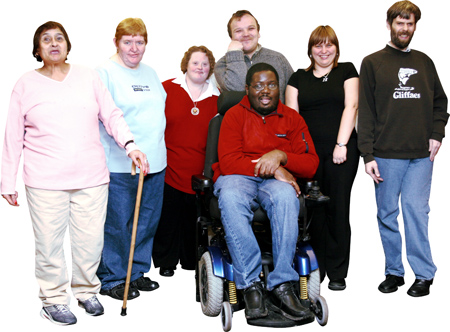 Support Coordination is specific service offered under the NDIS. Sometimes it can be hard to understand what the role does and how it can help you. We've put together this page to help you understand the benefits of coordination and what it really means.
Support Coordination is specific service offered under the NDIS. Sometimes it can be hard to understand what the role does and how it can help you. We've put together this page to help you understand the benefits of coordination and what it really means.
The intention of this service is to help people implement their plan, and where necessary assist with specialised service delivery to access or build services that meet their needs. The NDIS criteria for this service includes providing 'choice and control' is service or support use, and 'supported decision-making.'
Support Coordination can be very important
It is intended to provide you the ability to access, manage and use your services and supports (and NDIS funding) when you need help to do so. You can ask for suppport coordination at a plan review or request it under 'change of situation' with the NDIS if your plan no longer meets your needs (e.g. you move house, or your functional capacity changes).
Along with plan management (if you have this), it is called an intermediary service by the NDIS. This is because both these types of roles sit between you and all other services/supports providing you with the essential and personalised support and assistance to make the best use of your NDIS plan.
The Support Coordination Role
 In terms of choice and control, a support coordinator will generally (wherever possible) seek to provide you with a range of options/providers or other things to explore and then work through these with you so you can decide (your choice) which you think would best suit you. This is a fundamental way to provide person-centred assistance.
In terms of choice and control, a support coordinator will generally (wherever possible) seek to provide you with a range of options/providers or other things to explore and then work through these with you so you can decide (your choice) which you think would best suit you. This is a fundamental way to provide person-centred assistance.
It is always YOUR choice to choose the options you wish to pursue with YOUR plan funds. In this way a support coordinator acts as a trusted adviser.
The other roles a coordinator performs in their functional role are:
⇒ Brokering - this means helping YOU engage and set up the service/support you wish with a party and the manner you want it to operate. It may include negotiating all aspects of a service.
⇒ Monitoring - this means ensuring a service/support does what it is supposed to be doing in a quality and safe way (e.g. you are not getting what was agreed or there is a staffing or other problem with a service/support). A coordinator can assist by helping you meet with your provider to sort issues like these out... or if needed... move to a new provider.
⇒ Researching - this means your coordinator needs to know (or find) where to access services and supports not just in the disability sector but also the community, mainstream (public or government services) and similar areas too. Knowing where there are options to access a service/support to address a person's needs is a constantly evolving and changing area.
⇒ Capacity Building - this means helping to increase your knowledge to access and use service/supports yourself, understand how to utilise you NDIS funds (called implementation), and how to better under the NDIS and its processes.
⇒ Reporting - coordinators are required to report to the NDIS (generally) a few months after commencing service and then annually (for multi-year plans), and at the end of a plan period. A Progress Report is generally required annually and an Outcomes/Review Report in the last three months of the plan cycle.
⇒ Safeguarding - coordinators may often have some level of involvement and knowledge through their monitoring roles of all your other services/supports. If they see things are not working as intended they are required under the NDIS Code of Conduct and/or mandatory reporting laws to ensure you are free from abuse, neglect, etc. For this reason they are often a first party to recognise these issues and are legally bound to report / inform authorities.
Likewise, its important to consider... very carefully... what is possible and reasonable to do within the 'support coordination' funds allocated to you. SchemeWise support coordinators will take the time to explain this up front and then we will decide with you where we will place our focus in terms of how we will help and what things you can do yourself (or with other help also).
aaa
UNDER THE NDIS HOOD
In late 2020, the public disclosure of the NDIS Support Coordination Standard Operating Procedure (SOP) - which is an internal document that planners use to decide how much coordination funding you get - has made it clear that based on a person's disability, past planning, and risk profile that the NDIS groups people as follows (per 12 month cycle):
- Low Coordination funds - generally only 24 hours provided.
- Medium range - 25 to 50 hours provided (most poeple will get 30-40 hours).
- Complex circumstances - 50 hours plus provided.
- In very complex situations, where more than one issue is present - 100 hours plus.
As an example of how this SOP may be applied, a person entering the NDIS for the first time may be given a medium range budget. In their next cycle, based on the fact that a support network would be 'in place' or 'started' sometimes the NDIS would reduce (cut) these funds to the low category in the next plan. And possibly the third planning cycle, no coordination funds would be given. This can seem quite unfair if it happens too quickly... and can place people 'at risk.'
IMPORTANT: Sometimes there may be a longer term need for coordination funds... like if a person does not have much support around them OR has a very complex or high impact disability (physical or cognitive) OR their support network is unstable or needs replacing. These can be reasons to discuss your needs with NDIS or LAC planners. In most cases, you'll need to be prepared to 'stand your ground' on your needs and insist on this type of service.
It is always vitally important to ensure you and your representative/s make it clear at your plan review what help you need and why... at each review. You need to particularly highlight what changes are occurring (e.g. loss of providers or need different ones) for you, etc. It also good to tell planners how your support coordinator has helped you, and you feel you still need them.
A really big area is to highlight cognitive or intellectual/learning issues which means there may always be a need for coordination for supported decision-making (especially if family or friend cannot perform this role) and services management. A GP letter can help remind planners that a person has a particular need for support coordination too.
You also have the right to access a coordinator to help you... but equally you need to ensure the NDIS understands what that need looks like in terms of addressing your reasonable and necessary requirements too -this means thinking about how much help you need in terms of hours - think weekly or motnhly and then work up to what a year o service support looks like. Coordinators cannot do this for you as this crosses the line into 'advocacy.' A family member, friend, or plan nominee can be an advocate. If you don't have these people available to help, you can use an advocate by looking for one locally - here
If you have lost or do not have support coordination in your NDIS plan - please talk with us about the other ways SchemeWise can still help you. There are flexibity options available across other parts of your plan.
aaa
SchemeWise support coordinators help in the following ways
 We want to help you to undertand how SchemeWise support coordinators work. They can help you do the following:
We want to help you to undertand how SchemeWise support coordinators work. They can help you do the following:
√ Assess all the options for mainstream, community, informal and provider supports (within the level of coordination funding provided. E.g., the focus of a Level 2 service is to implement the NDIS plan as funded and connect a person with mainstream services. For a Level 3 specialist service, the focus is on interacting with mainstream and other services where there are high and complex issues so a person can make best use of their NDIS plan);
- √ Implement the NDIS plan including help to choose preferred options or providers and over time increase your capacity to direct and manage your own supports/services and exercise choice and control (if this is safe for you to do);
- √ Use the NDIS portal and know how to access plan information and provide evidence (with the release of the NDIS PACE system in October 2023 - also help you review your budget, endorse providers and help you control what information providers can see about you);
- √ Organise therapy services that may be required to treat, reduce or limit the impact of a person's disability (after you choose a provider);
- √ Help you to negotiate services and prices develop service agreements (contracts) and help establish service bookings (if self-managing) with preferred providers, make changes to provider service agreements and help people understand their responsibilities;
- √ Help you decide the budget for each support and inform others (e.g. a provider, a plan manager) how the funds will be spent;
- √ Help increase your options to link with mainstream or community services including education or vocational training, health, mental health, housing and/or transport;
- √ Assist you to explore housing options and help plan life transitions - e.g., a coordinator may help you explore various types of housing, and develop a plan for discussing with the NDIS how you can make that happen. They may also help you apply for public housing, or with discharge planning from a hospital, or leaving school and transitioning to work or training;
- √ Get value for money for the supports you receive (make sure you get the full value of your plan). A coordinator may also help you sort out incorrect billing by a provider (if you don't have a plan manager);
- √ Enquire to the NDIS (if authorised to do so) issues with your NDIS plan or help you do this - commonly this involves issues around accessing and obtaining approval for AT equipment or clarifying issues which limit you being able to use your plan;
- √ Help resolve points of crisis, problems or issues that cause problems implementing your plan (a crisis means service/support issues - not general life issues like family breakdown), this might include helping you with emergency/disaster or other safety planning too (like making a COVID plan to stay safe);
- √ Take action and make reports if they believe you are unsafe in any way or become unwell (includes calling police, ambulance, etc), and/or if you are behaving in an unsafe way toward others. Likewise, a coordination service may need to increase contact with you when things are not going well compared to when they are to support your wellbeing;
- √ Undertake particular NDIS activities with you and/or your representative - including assisting with plan reviews by looking at progress towards goals, helping you make new goals and recording your progress, or making decisions about any different supports you may need, assessing whether you achieved a goal(s), requesting reports from other providers, and help ensure you achieve value for money under your plan (e.g. by establishing budgets for your various services and monitoring these with you).
Your SchemeWise support coordinator will also work and interact with your plan manager too (if you have one) to help you keep within service budgets and help make adjustments to funds use (if you need this support).
They will also work with you directly on these matters too. If adjustments to services are required (e.g. because your budget is running low or you no longer need as much of something and want to do something else) your support coordinator will help you make adjustments to services/supports (this is important so you DO NOT end up with a personal debt OR to ensure best use your funds to lead a great life).
aaa
PLEASE NOTE:
Over time the NDIS may decrease its funding of support coordination services to a participant (this is what it means by capacity building - for you to do it yourself in future), as people better understand how to use their plan funds to access supports and services. However, in some cases this is also not appropriate and ongoing support coordination may always be needed. E.g. the person has cognitive or intellectual or a degenerative/unstable disability condition and requires support for decision-making and managing services they use.... or their informal support network (family/friends) are unable to assist them or cannot help any longer. It is very imrpotant you advocate for support coordination in your plan - a coordinator is NOT allowed to do this.
Support coordination funding is NOT guaranteed at the same level across plan cycles. For this reason, setting expectations of what can be achieved with your support coordination funds and to what degree is very important to do each and every new plan.
Your SchemeWise support coordinator will help you do this through completing a new service plan for each 'NDIS plan' you receive. This helps clarify how your support coordiantor will work with you, and also agree what they will do, and what things you will do yourself (or your representatives). They will also seek to understand the best way to help you learn more and build your capacity to direct services/supports and your NDIS plan yourself (if possible) in the future.

How do you know a good coordinator from an ordinary one?
Great question. Here's a few pointers to check.... (HINT: you can use this as a checklist)
⇒ A good coordinator will have a heath or allied-health background and can work as a specialist coordinator too. This means a diploma/bachelor level or higher qualification (not a certificate or lived experience only). If a coordinator does NOT have this education background they may not know very much about how different systems work together (e.g. health, mental health, justice, child protection, education, vocational training, employment, housing, etc). This can affect the way your NDIS funds work with other mainstream services in providing you a holistic support network and being able to live your best life.
NOTE: This can really affect understanding the complexity within service systems. A diploma or degree is 3 to 4 years of study while a certificate 3 is 6-12 months. Masters level qualifcations often require 5-6 years of tertiary study. The depth of experience and knowledge can therefore be profoundly different. For this reason... all SchemeWise coordinators have health OR allied-health qualifications to provide our customer's a quality-assured and professional service. At this level, they are also registered under the government health professionals board (or a professional organisation) too - providing you a very high level of quality assurance. There is no quality guarantee available in Australia for coordinators having only Certifcate qualifications or lived experience - using such parties can place you at greatly increased risk, unnecessarily, and this can have flow on effects to your NDIS planning outcomes (e.g. loss of planning funds). SchemeWise coordinators regularly help people who have had low quality coordination experiences get things back on track.
⇒ A great coordinator, in addition to the above, may ALSO have lived experience of disability in their family. They see both sides of the equation, and will be experienced with disability, rehabilitation and the health system, in particular.
⇒ An exceptional coordinator also understands the various NDIS literature, legislation, rules and guidelines (and they likely have a background in working within complex systems like public administration or services too). They know how to go about getting things done the right way, the first time (saving you from frustration, NDIS refusals, or significant repeated effort). And they will help you understand along the way too! REMEMBER the NDIS is very complex, and if the wrong things occur it can take a really long time to get fixed.
⇒ They look for and insist on quality from other providers too (like adherence to the NDIS Code of Conduct, NDIS Guidelines and Pricing Arrangements as well as the use of a service agrement so you know what you are paying for and should receive) - ensuring you have the best services and supports possible and that they are safe and fit for purpose.
⇒ They are pro-active in contacting you and touching base. If you are not hearing from them to see how they can help... why are you staying? This in our view represents a poor support coordination experience.
Have you experienced the SchemeWise difference yet?
Why not talk with us soon.
What Support Coordinators CANNOT do
 There's a few things support coordinators are not allowed to do. The NDIS has decided this because this service role does not provide daily supports for people. It is NOT intended to replace people from doing things and making their own decisions (called choice and control) or doing things that a support worker or family member might do. Rather the focus of support coordiantion is to help augment a person's capacity to understand and be supported to take charge themselves, as well as access safe services and direct them.
There's a few things support coordinators are not allowed to do. The NDIS has decided this because this service role does not provide daily supports for people. It is NOT intended to replace people from doing things and making their own decisions (called choice and control) or doing things that a support worker or family member might do. Rather the focus of support coordiantion is to help augment a person's capacity to understand and be supported to take charge themselves, as well as access safe services and direct them.
Its a bit like a jigsaw puzzle... but important to know.
Understanding the do's and don't's... can really help you get the most out of your coordination service and understand how other services operate too.
Your SchemeWise support coordinator can talk to you about your needs anytime and will explain how they can help around any particular issues too.
While we've mentioned what a coordinator can help you do above - below are some of the don'ts that you must do yourself (or get help from your representative, or family members):
X Sign a service agreement (contract) on your behalf - coordinators are not a party to the contract and cannot act in this manner. Your coordinator will help you or your representative sign an agreement in a form suitable for you and help you understand the terms of service being offered (plus ensure it meets NDIS payment and other rules, etc).
X Make requests to NDIA for unscheduled plan reviews - a good coordinator will support and help YOU to do this instead - ensuring you also have the evidence to support such need.
X Provide transport for participants - this means they cannot take you places (or pick you up).
X Undertake funds administration - this means manage the funding of your plan (either you, the NDIA, or a plan manager must do this). A SchemeWse coordinator will work with you and/or your plan manager to understand, set budgets, or help solve service payments issues though.
X Organise support rostering - the NDIS refers to this as day-to-day scheduling - it includes cancelling a serivce episode too. This is the responsibility of you, your representatives/informal supports (family) along with your daily support provider.
X Give notice to a provider to end a service agreement (contract). They may support you to do this, as a coordinator is not a legal party to a service agreement. Instead, your coordinator may help you (and/or your representative) understand the Notice period required to change / end a service or support, and then how to go about providing the required Notice and helping you do this (if needed). Your coordinator will also help you to locate a new provider or change to another you have chosen.
X Undertake advocacy - a good coordinator will however highlight issues under the NDIS legislation, seek due process is followed for your circumstances (e.g. by NDIS planners), advise what evidence is available or point to this, and where you cannot readily speak for yourself (and no others are available) help you to connect to a local disability advocacy group.
X Do not provide services rightly required by other mainstream providers (e.g. if you go to hospital then the professionals there are in charge of your health and disability care planning, and ensuring you receive all the support necessary to help get well again). Your coordinator may help with discharge planning and transition back to home however - ensuring you have the supports needed to stay safe, once home.
X Is unable to provide a service outside the scope of the funding approved under your plan. E.g., if you have been provided Level 2 coordination funds and interactions with mainstream providers are required (not simply connect with/transition from), then SchemeWise cannot perform that role. This is a specific limitation of the various coordination level roles imposed by the NDIS which all support coordinators' are required to follow.
• A Level 2 coordination service is about 'implementing the plan as funded and connection to/transition from mainstream/community services' only. They CAN help you locate these services near you, if you need them.
• If ongoing engagement and interactions with mainstream providers are required to help with particular risks or complex matters, then you must obtain or be able to fleixible access Level 3 specialist coordination funding, firstly. This requirement is imposed by the NDIS. Some examples of this need may include:
- you have a legal matter at a Court or have been in a custodial setting and are returning to community life;
- you have lost your housing or need to find different housing to meet your complex needs,
- you have ongoing and regular involvement with a child protection services;
- you live with a complex health & disability matter (or more than one) and require active support to stay well.
X Provide direct disability support to you (except under special circumstances like an emergency while help is sought).
Your SchemeWise Support Coordinator is YOUR trusted support.
We work within the above guidance to provide you... quality-assured and expert service.
